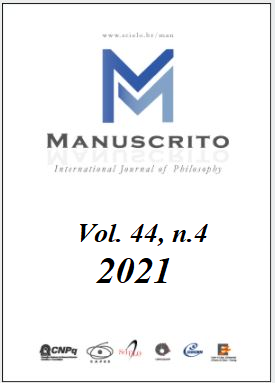Resumo
Two of the most important outcomes of The Contradictory Christ include: (i) identifying Christ as an unproblematically contradictory being as well as (ii) laying the foundations of an investigation of the logical consequences of the existence of Christ, qua contradictory, within a particular 'theory'. In light of the enormous relevance of Beall’s The contradictory Christ for the study of inconsistency, my main concern here is to explore the effect of some methodological choices behind Beall’s proposal -this in order to recognize in more detail the scope of Beall’s contribution. To do so, I will focus on three main questions: 1. What is required for the identification of a contradiction? 2. How can we recognize a true contradiction from either an apparent or a temporal contradiction? 3. If we identify a true contradiction within a theory, where can we actually go from there?
Referências
Batens, D. (1998): “Paraconsistency and its relation to worldviews”, Foundations of Science, Volume 3, Issue 2: 259--283.
Batens, D. (2002): “In Defence of a Programme for Handling Inconistency”, in Inconsistency in Science , Kluwer Academic Publishers, Netherlands: 129--150.
Beall, Jc (2020). The Contradictory Christ, Oxford Studies in Analytic Theology.
Boccardi, E. and Macías-Bustos.M. (2017). “Contradictions in motion: Why they’re not needed and why they wouldn’t help”, HUMANA.MENTE Journal of Philosophical Studies, 10(32): 195-227.
Boyer, C.B. (1949). The history of the calculus and its conceptual development , New York Dover.
Brigandt, I. (2010). “Scientific reasoning is material inference: Combining confirmation, discovery and explanation", International studies in the philosophy of science 24(1): 31-43.
Brown, B. (1990): “How to be realistic about inconsistency in science”, Studies in History and Philosophy of Science 21 (2): 281--294.
Brown, B. and G. Priest (2015): “Chunk And Permeate, A Paraconsistent Inference Strategy. Part I: The Infinitesimal Calculus”, Journal of Philosophical Logic 33: 379--88
Brown, B. and G. Priest (2015): “Chunk and permeate II: Bohr’s Hydrogen Atom”, European Journal for Philosophy of Science Vol. 5, Issue 1: 1--18.
Bueno, O. (1997): “Empirical Adequacy: A Partial Structures Approach”, Studies in History and Philosophy of Science 28:585--610
Bueno, O. and S. French (2011): "How theories represent", The British Journal for the Philosophy of Science 62 (4): 857-894.
Davey, K. (2014): “Can good science be logically inconsistent?”, Synthese ( S.I. Is Science Inconsistent? ) 191: 3009--3026.
Edwards, C. H. (1979). The historical development of the Calculus . New York: Springer-Verlag.
Harman, G. (1984). “Logic and Reasoning”, Synthese , Vol. 60, No. 1, Foundations: Logic, Language, and Mathematics, Part I, pp. 107-127.
Kapitan, T. (1982). “On the concept of material consequence" History and Philosophy of Logic 3: 193-211.
Ylikoski, P. (2013): “The Illusion of Depth of Understanding in Science”, in H. De Regt, S. Leonelli and K. Eigner (eds.) Scientific Understanding: Philosophical Perspectives, Pittsburgh University Press: 100-119.
Lakatos, I. (1978): The Methodology of Scientific Research Programmes: Philosophical Chapters , Vol. 1. Cambridge University Press.
Laudan, L. (1977): Progress and its Problems . Ewing, NJ: University of California Press.
Lawler, I. (2019): “Scientific understanding and felicitous legitimate falsehoods:. Synthese .
Martínez-Ordaz, M. del R. (2020): “The ignorance behind inconsistency toleration”, S.I. Knowing the unknown, Synthese .
Meheus, J. (2002): “How to reason sensibly yet naturally from inconsistencies”, in Inconsistency in Science , Kluwer Academic Publishers, Netherlands: 151--164.
Michael, M. (2016): “On a “most telling” argument for paraconsistent logic", Synthese 193 (10).
Priest, G. (1987): In Contradiction: A Study of the Tranconsistent (1st edition), Clarendon Press. Oxford.
Priest, G. (1998): “What is so bad about contradictions?”, Journal of Philosophy 95 (8):410--426.
Priest, G. (2006): Doubt truth to be a liar . Oxford: Oxford University Press.
Putnam, H. (1981). “The corroboration of theories”, in Hacking, I. (ed) Scientific Revolutions, Oxford, NY: Oxford University Press: 121-137.
Šešelja, D. (2017): “Scientific Pluralism and Inconsistency Toleration”, Humana Mente 32: 1-29.
Smith, J. (1988): “Inconsistency and scientific reasoning”, Studies in History and Philosophy of Science Part A 19 (4):429-445.
Vickers, P. (2013): Understanding Inconsistent Science, Oxford University Press.

Este trabalho está licenciado sob uma licença Creative Commons Attribution 4.0 International License.
Copyright (c) 2021 Manuscrito: Revista Internacional de Filosofia


